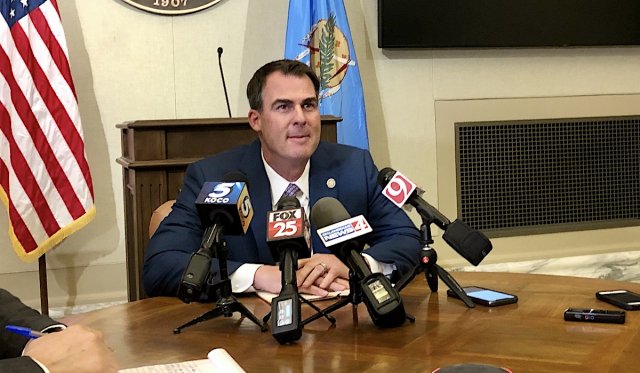
Businesses of all sizes have been affected by the novel coronavirus pandemic, and so have local governments of all sizes.
The loss of municipal and county sales tax revenues will be felt far and wide, and in some cases it already has been. Many cities in Oklahoma are bracing for leaner budgets in the near future. The City of Oklahoma City is planning to cut 3.3 percent from its budget in the coming fiscal year, which will likely include reductions to vital services such as police and fire departments. At the same time, municipalities and counties are spending money to combat the COVID-19 pandemic.
In letters to municipal and county leaders dated May 8, Oklahoma Gov. Kevin Stitt announced the formation of the CARES Act Finance Team aimed at helping towns, cities and counties get their shares of the $2 trillion in relief funds provided by the CARES Act, which Congress passed in March.
The state is also launching a new online platform where counties and cities can apply for reimbursements to cover COVID-19 related expenses.
“This new web-based platform will allow the state to effectively and transparently process reimbursement requests and deploy funds to communities in need of financial relief from COVID-19-related expenses,” Oklahoma Chief Operating Officer John Budd and Secretary of Budget Mike Mazzei wrote in a letter to the state’s mayors on May 8.
Definition of COVID-related expense varies
Mike Fina, executive director of the Oklahoma Municipal League, said it’s not yet entirely clear what the federal government will consider a COVID-related expense.
“That’s not the state’s fault. It’s been more of the federal government’s fault,” Fina said. “There really hasn’t been a lot of guidance on what is COVID-related expense. We looked at what there is out there and told our members what they should focus on.”
Fina said some of the largest costs incurred so far by municipalities in Oklahoma are IT-related.
“That comes from the fact that we have a lot of city halls that are working from home,” he said. “Those expenses might end up outpacing everything else other than personnel.”
Fina said in most cases front-line needs such as personal protection equipment for police and fire departments have been provided by the state or the Federal Emergency Management Agency. But there are other expenses, like sanitizing public spaces such as police stations, city halls or county courthouses, that require the purchase of supplies or the hiring of contractors to do the work.
A fraction of requests processed so far
At the time the letters were sent, $93.4 million in reimbursement requests had been submitted to the state, and only about 9 percent of those requests had been processed.
Stitt said Monday that he hopes to have the platform fully operational within a week.
“It’s our goal by Monday the 18th to have the platform set up where those municipalities can start submitting their invoices for COVID-related expenses so we can get those out the door,” Stitt said in a press conference.
Simplicity a focus
Fina said the Oklahoma Municipal League had assisted the state in the development of the portal, specifically advocating for the simplest process possible for those needing assistance.
But Fina said the most important thing will be getting the money where it’s needed as fast as possible. Because Oklahoma municipalities are funded by sales tax revenue, which has been hard-hit amid the pandemic, the extra funds are needed quickly.
“From those I’ve talked to, the reaction to the idea has been very positive,” Fina said. “We just need to get these funds out quickly. We’re the only state in the country solely dependent on sales tax revenue and that’s what’s been hit the hardest. We’re in desperate shape with that in a lot of places, so whatever can be done to streamline the process and make it faster is a good thing.”
Help for the arts
The Oklahoma Arts Council is also making available funding through the CARES Act to assist arts organizations in the state that have been impacted by the novel coronavirus pandemic.
Eligible organizations can apply for as much as $2,500 in funding with no match requirement. To apply, organizations must have non-profit status and have an annual operating budget of at least $10,000. Applications can be made here.
The deadline for applications is May 29. Awards will be determined June 16 by members of the Oklahoma Arts Council board appointed by Gov. Kevin Stitt.
Read the letter to Oklahoma mayors about the new platform
 Loading...
Loading...
Read the letter to county commissioners about the new platform
